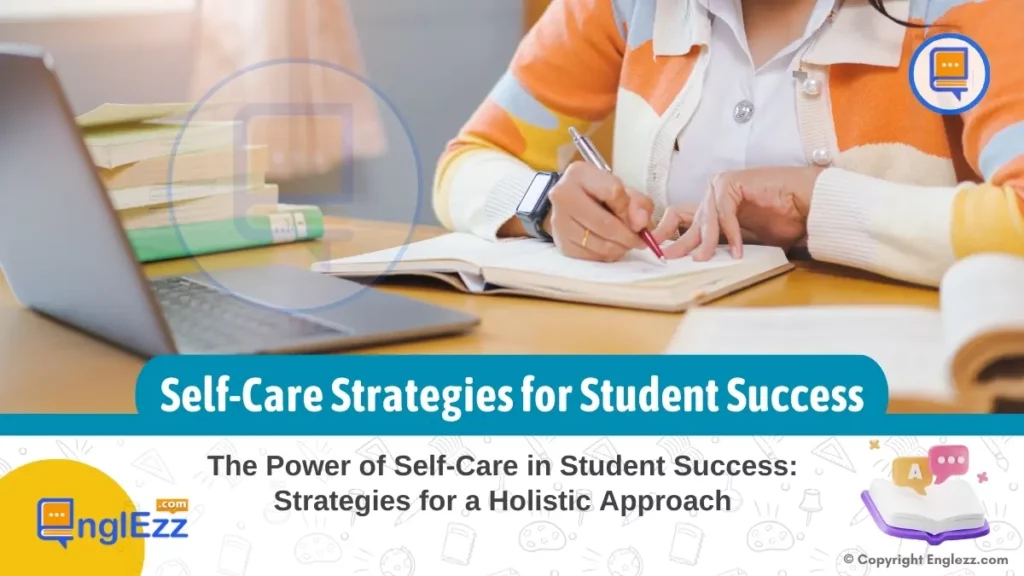In the bustling landscape of academia, where the pursuit of knowledge is intertwined with the demands of deadlines and commitments, the concept of self-care often finds itself overshadowed by academic rigor. Yet, a fundamental truth underpins the realm of student success: holistic well-being serves as a cornerstone for thriving in educational endeavors. Discover essential self-care strategies for student success in this holistic guide. Enhance well-being and academic performance today!
Focusing on the mosaic of student life reveals an intricate tapestry where self-care practices not only nurture personal growth but also lay a robust foundation for academic excellence.
8 Self-Care Strategies for Student Success
Embarking on a journey to explore the transformative power of self-care in student success unveils a rich tapestry woven with resilience, balance, and empowerment. Beyond textbooks and assignments lies an oasis brimming with strategies that harmonize mind, body, and spirit to propel students towards their aspirations. By delving into the essence of self-care — embracing mindfulness, nourishing through nutrition, energizing with physical activity, and replenishing with quality sleep — a holistic approach emerges as a beacon illuminating pathways to thriving amidst academic pursuits.

Join us in unraveling the artistry of holistic well-being tailored to elevate student experiences, empower flourishing minds, and pave avenues for lasting success.
Understanding Self-Care for Students
Self-care isn’t just about pampering oneself with occasional treats—it’s a fundamental practice that nurtures overall well-being, especially for students navigating the demands of academic life. In essence, self-care encompasses intentional actions taken to care for one’s physical, emotional, and mental health. It involves setting aside time to recharge, engage in activities that bring joy, and prioritize personal needs amid the hustle of student life. By recognizing the significance of self-care in maintaining balance and reducing stress levels, students can enhance their resilience and ability to cope with challenges effectively.
The connection between self-care and stress management is profound. When students neglect their well-being in pursuit of academic excellence or extracurricular commitments, stress can accumulate rapidly, leading to burnout and diminished performance. Implementing regular self-care practices serves as a powerful antidote to stress by offering moments of relaxation, rejuvenation, and mindfulness amidst deadlines and pressures. By proactively addressing stress through self-care techniques like deep breathing exercises or journaling, students can cultivate emotional stability and mental clarity crucial for academic success.
Furthermore, the impact of self-care extends beyond reducing stress—it plays a pivotal role in safeguarding mental health and optimizing academic performance. Engaging in activities that promote self-awareness, such as meditation or creative hobbies, can bolster psychological well-being by fostering a sense of purpose and inner peace. When students prioritize their mental health through self-care practices tailored to their unique needs, they create a supportive foundation for sustained focus, motivation, and learning outcomes. By acknowledging the interplay between self-care, mental health, and academic success, students empower themselves to thrive holistically throughout their educational journey.
Mindfulness for Student Success
Mindfulness, a powerful self-care strategy for students, offers a pathway to cultivate focus and inner peace amidst the whirlwind of academic demands. By introducing mindfulness techniques such as deep breathing exercises or short meditation breaks throughout the day, students can navigate stress more effectively. The benefits of incorporating mindfulness into daily life extend beyond stress reduction; it also enhances concentration, boosts cognitive function, and promotes emotional well-being. For example, taking just five minutes between study sessions to practice mindfulness can help clear the mind and improve information retention, leading to more efficient learning.
Practical tips for integrating mindfulness into a busy student schedule include setting aside specific times for mindfulness practices, whether it’s upon waking up, during breaks between classes, or before bedtime. Utilizing resources like mobile apps or online guided meditations can aid in establishing a consistent mindfulness routine. Moreover, incorporating mindful activities into everyday tasks — such as focusing on the sensations while eating or walking mindfully to class — can seamlessly infuse moments of calm and awareness into even the most hectic schedules. By weaving mindfulness practices into their daily routines, students can enhance their overall well-being and academic performance.
Incorporate brief yet impactful self-care practices into your daily routine. Whether it’s taking a short walk between study sessions, practicing deep breathing exercises before bed, or enjoying a healthy snack break, these small moments can make a significant difference in your overall well-being. Remember, consistent small acts of self-care add up to create a foundation of resilience and vitality.
For instance, imagine a student feeling overwhelmed by an impending deadline. Instead of succumbing to panic, they practice a brief mindfulness exercise to ground themselves in the present moment. This pause allows them to approach their tasks with renewed clarity and composure. By embracing mindfulness as a self-care tool rather than viewing it as yet another task on their agenda, students can shift from merely surviving their academic journey to thriving in both their personal growth and educational pursuits.
Nutrition and Healthy Eating Habits
In the whirlwind of student life, maintaining a balanced diet often takes a backseat. However, the role of nutrition in supporting overall well-being cannot be overstated. Just like a well-oiled machine, our bodies require proper fuel to function optimally. Consuming a variety of nutrient-rich foods not only nourishes the body but also fuels the mind, creating a solid foundation for academic success. Imagine your brain as a high-performance vehicle; it needs premium fuel to operate at its best. By making mindful choices about what you eat, you can sharpen your focus, enhance memory retention, and boost cognitive performance.
Guidance on healthy eating habits is especially crucial for students juggling hectic schedules. Easy swaps like opting for whole grains over refined carbs or incorporating more fruits and vegetables into your meals can make a significant difference in your energy levels and productivity. For instance, starting your day with a nutritious breakfast sets the tone for sustained mental clarity throughout those morning lectures. Simple adjustments like carrying healthy snacks to munch on during study sessions can prevent energy crashes and keep you alert when it matters most.
Integrate mindfulness principles into your time management strategies to enhance productivity and reduce stress. By focusing on one task at a time with full awareness, you can improve concentration and efficiency while also fostering a sense of calm amidst academic pressures. Consider using techniques like the Pomodoro method or creating a prioritized task list each day to stay organized and mindful in your approach.
The impact of diet on energy levels and cognitive function is profound. Picture this: swapping sugary sodas for water or herbal teas can keep you hydrated and focused during long study sessions without the dreaded sugar crash afterward. Incorporating omega-3 fatty acids from sources like fish or nuts supports brain health and improves concentration—a small dietary change that can yield substantial academic benefits. By viewing food not just as sustenance but as an essential component of your academic toolkit, you empower yourself to excel both inside and outside the classroom through smart nutritional choices designed to fuel your success.
Physical Activities for Student Success
Physical activity plays a vital role in enhancing student well-being, both physically and mentally. In the whirlwind of academic responsibilities, making time for regular exercise can sometimes take a back seat. However, prioritizing physical activity is key to maintaining a healthy lifestyle and improving overall productivity.
Engaging in exercises doesn’t have to mean committing hours at the gym; simple workout routines tailored to busy student schedules can make a significant difference. For instance, incorporating short bursts of activity like stretching or going for quick walks between study sessions can boost circulation, improve focus, and alleviate stress.
Even amidst demanding coursework, students can benefit from choosing activities they enjoy, such as dancing, yoga, or even quick bodyweight workouts that require minimal equipment and time commitment. These exercises not only promote physical health but also contribute to mental wellness by releasing endorphins—the feel-good hormones that can elevate mood and reduce anxiety levels. The positive impact of physical activity on cognitive function and academic performance cannot be understated; studies suggest that regular exercise enhances memory retention and information processing speed.
Moreover, implementing active study breaks where students engage in brief physical activities like jumping jacks or squats can rejuvenate their minds and bodies. Encouraging movement throughout the day through activities like taking the stairs instead of the elevator or walking while brainstorming ideas with classmates fosters an environment supportive of holistic well-being. By recognizing the symbiotic relationship between physical activity and academic success, students empower themselves to harness the benefits of an active lifestyle while excelling in their educational pursuits.
Optimizing Sleep Quality
Adequate sleep is not just a luxury; it is a vital component of student success. Research has consistently shown that quality sleep is linked to improved cognitive function, memory consolidation, and overall academic performance. When students prioritize their rest, they equip themselves with the mental clarity and focus needed to excel in their studies. Imagine sleep as the reset button for your brain – each night’s rest allowing you to start fresh and retain information more effectively.
To enhance sleep quality, creating a bedtime routine can work wonders. Engaging in relaxing activities before bed, like reading a book or practicing mindfulness techniques, signals to your body that it’s time to wind down. Establishing a consistent sleep schedule helps regulate your internal clock, leading to better quality sleep over time. Additionally, creating a soothing sleep environment by keeping your room cool and dark can further promote restful slumber.
Cultivate supportive relationships with peers who understand the challenges of student life and value holistic well-being. Join study groups, clubs, or online communities where you can exchange ideas, share experiences, and offer mutual support. Having a network of like-minded individuals can provide emotional encouragement, practical advice, and a sense of belonging that fuels both personal growth and academic success.
The connection between adequate sleep and learning is profound. During deep sleep stages, the brain consolidates newly acquired information, making it easier for students to recall facts and concepts learned during the day. By prioritizing sufficient rest, students not only optimize their academic performance but also support their overall well-being. Think of quality sleep as an investment in your future success – one that pays dividends in both your educational journey and personal growth.
Building Support Systems
In the fast-paced world of academia, building robust support systems can be a game-changer for students aiming to thrive both academically and emotionally. Fostering positive social connections is not only about having people around you; it’s about surrounding yourself with individuals who uplift and motivate you. Whether it’s sharing study tips with a classmate or seeking advice from a trusted professor, these interactions can create a sense of camaraderie that fuels your journey towards success.
Seeking support from peers, educators, or counselors can provide unique perspectives and solutions to challenges you may encounter. Peers can offer empathy and understanding since they are likely going through similar experiences. Educators, on the other hand, can provide guidance and mentorship tailored to your academic needs. Counselors offer professional insight and strategies for managing stress, anxiety, or any emotional hurdles that may impact your academic performance.
Creating a strong support network involves intentional actions such as joining study groups, attending campus events, or reaching out to mental health services if needed. Building connections within your academic community not only enhances your emotional well-being but also opens doors to new opportunities for growth and personal development. Remember, asking for help is not a sign of weakness; it’s a proactive step towards holistic self-care.
By nurturing positive relationships and actively seeking support when necessary, students can navigate the complexities of university life with resilience and confidence. As the saying goes, “It takes a village,” and in the realm of education, having a supportive village around you can make all the difference in your educational journey.
Balancing the Demands of Academic Life
Balancing the demands of academic life with self-care is a crucial component of student success. In today’s fast-paced educational environment, it’s easy for students to get caught up in the pressure of deadlines and assignments, neglecting their well-being in the process. By discussing time management strategies that emphasize self-care alongside academic responsibilities, students can achieve a harmonious balance that promotes both personal wellness and academic achievement.
One effective approach is to prioritize tasks based on importance and allocate dedicated time for self-care activities within their schedules. For example, setting aside specific hours each week for exercise, mindfulness practices, or social activities can help maintain a healthy equilibrium.
Setting boundaries and recognizing personal limitations are essential aspects of avoiding burnout as a student. It’s important for learners to understand that it’s okay to say no to additional commitments when they feel overwhelmed or overextended. By learning to prioritize their mental health and well-being, students can prevent exhaustion and maintain sustainable levels of productivity throughout the semester. Examples like implementing a daily cutoff time for studying or designating specific days for relaxation can assist students in creating clear boundaries between academic work and personal time.
Emphasizing the long-term benefits of maintaining a balanced approach to education underscores the significance of fostering habits that contribute to overall well-being beyond immediate academic goals. By incorporating self-care practices into their daily routines consistently, students not only enhance their current performance but also cultivate resilience and sustainability in their learning journey.
A holistic view that values both academic achievements and personal growth acknowledges the interconnected nature of success, advocating for a mindset that prioritizes self-care as an integral part of educational excellence. Ultimately, by striking a healthy equilibrium between study commitments and self-care rituals, students pave the way for sustained success and fulfillment in both their academic endeavors and personal lives.
Empowering Students for Success Through Holistic Self-Care
As we conclude our journey exploring the power of self-care in student success through a holistic lens, it becomes evident that prioritizing one’s well-being is not only beneficial but essential for thriving academically and personally. By delving into mindfulness practices, promoting healthy eating habits, incorporating physical activity into daily routines, optimizing sleep quality, nurturing support systems, balancing academic workloads with self-care, and reiterating these invaluable strategies to students, educators, and parents alike, we are paving the way for a brighter and more sustainable educational experience.

By embracing self-care as a cornerstone of student life, individuals can cultivate resilience, enhance mental health, boost academic performance, and create a foundation for lifelong well-being. With the tools provided in this comprehensive guide, students can navigate the demands of academia while fostering a deep sense of self-awareness and empowerment. Let us continue to advocate for holistic approaches to education that honor the intricate connection between self-care and student success.
FAQs:
Q: How can students find time to practice self-care amidst their busy schedules?
A: Setting small goals each day for self-care activities like taking short breaks between study sessions or engaging in mindful breathing exercises can help integrate self-care seamlessly into daily routines.
Q: Is it possible to maintain healthy eating habits on a tight budget as a student?
A: Yes! Planning meals ahead of time, opting for cost-effective yet nutritious options like beans, oats, fruits, and vegetables, and avoiding excessive intake of fast food can support students in maintaining a balanced diet without overspending.
Q: What are some effective ways to build strong support systems as a student?
A: Actively participating in campus clubs or organizations, reaching out to professors or counselors for guidance when needed, and staying connected with friends or family members can contribute to building robust support networks during challenging times.
Q: How does physical activity benefit students beyond just physical health?
A: Engaging in regular exercise not only improves physical fitness but also enhances cognitive function by promoting better focus, memory retention, and mood regulation—essential elements for academic success.
Q: Can self-care practices really make a difference in reducing academic stress levels?
A: Absolutely! Prioritizing self-care activities such as mindfulness meditation or relaxation techniques has been shown to lower stress levels significantly by promoting emotional regulation and enhancing overall well-being.
Incorporating these final tips into your student journey can empower you to create a sustainable balance between academic pursuits and self-care practices. Remember that investing in your well-being is not only essential for navigating the rigors of education but also for fostering long-term resilience and fulfillment in all aspects of life.









🧑🎓Prioritize self-care for student success!
😍🍏 Explore 8 holistic strategies to boost mental health, productivity, and educational achievements.
#englezz#cpd